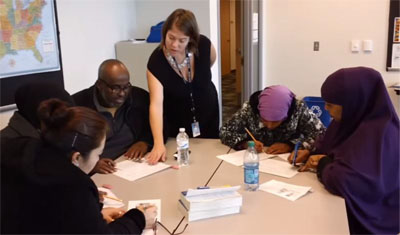- MN ABE Connect
- Archive
- Skills to Pay the Bills
 October 5, 2015
October 5, 2015
Skills to Pay the Bills
Stephanie Sommers, ACES CoordinatorWhen it comes to helping our adult students succeed and get ahead, few things that we can teach them are as important as “soft” skills. Students who are able to successfully navigate the workplace by networking, acting in a professional manner, and being open to feedback, for example, are going to be the employees who get noticed in a positive way.
According to a report published in November 2014 by the National Association of Colleges and Employers (NACE), employers considering new hires are looking for leaders who can work as part of a team and communicate effectively. When employers participating in NACE’s Job Outlook 2015 survey were asked which characteristics they look for in a candidate, the largest group of respondents (77.8 percent) said “leadership” and “the ability to work in a team structure.” These were followed by “problem-solving skills” (70.9 percent) and “strong work ethic” (70.4 percent). Clearly, these skills are important for new employees hoping to gain a foothold in the world of work.
For more evidence of the importance of soft skills, one need look no further than the Transitions Integration Framework (TIF). When the TIF was being designed, soft skills were infused throughout several of the categories, and they are especially integral to Navigating Systems. In turn, the Navigating Systems category has become an important component of the Employability and Career Awareness domain as part of the new Minnesota State Adult Diploma.
Featured Resource: Skills to Pay the Bills
 Teachers looking for resources to help their students demonstrate competency of these skills will be interested to learn about a resource that was developed by the U.S. Department of Labor called Skills to Pay the Bills: Mastering Soft Skills for Workplace Success. This downloadable activity guide has recently been added to the ACES resource library under the category of Navigating Systems.
Teachers looking for resources to help their students demonstrate competency of these skills will be interested to learn about a resource that was developed by the U.S. Department of Labor called Skills to Pay the Bills: Mastering Soft Skills for Workplace Success. This downloadable activity guide has recently been added to the ACES resource library under the category of Navigating Systems.
It is comprised of six modules that focus on the key areas of:
- enthusiasm and attitude
- teamwork
- communication
- critical thinking and problem solving
- networking
- professionalism
Each module has five ready-to-go activities that are designed to take 20-30 minutes, on average, to complete. There is also a Skills to Pay the Bills video series with short videos that demonstrate the importance of these skills in a humorous, lighthearted way. I recently used the Enthusiasm and Attitude video in a low-intermediate level listening and speaking class for ESL learners to demonstrate the importance of body language and nonverbal communication. The students thought it was funny and were very engaged in picking out all the things that the “bad” interviewee did to make a negative first impression.
An additional benefit to using these materials is that they were designed to be very inclusive and to account for differing ability levels and learning styles. In fact, the project was created by the Office of Disability Employment Policy (ODEP), which is part of the Department of Labor. As part of the development process, the activities were piloted by youth between the ages of 14-21 from seven different youth programs across the country. Here is some of feedback from pilot participants:
- “When students are writing or talking in class or at an interview they sound like they are on the streets talking to a friend, who would want to hire someone like that? And that’s where I feel soft skills should come in for young people. (We) never learn about these things. I feel the younger people are when they learn these skills, as they get older it won’t be a problem.”
- “I was putting things in my text messages that I shouldn’t have and I learned about it during the ODEP project. It was fun because I didn’t know that people text that way.”
- “I found the activities to be very energizing and adaptive for any age group.” (facilitator from FL)
Newsletter Signup
Get MN ABE Connect—the official source for ABE events, activities, and resources!
Sign UpArticle Categories
- ABE Foundations/Staff Onboarding
- ACES/Transitions
- Adult Career Pathways
- Assessment
- CCR Standards
- Citizenship
- COVID-19
- Cultural Competency
- Digital Literacy/Northstar
- Disabilities
- Distance Learning/Education
- ELA
- Equity/Inclusion
- ESL
- HSE/Adult Diploma
- Listening
- Math/Numeracy
- Mental Health
- Minnesota ABE
- One-Room Schoolhouse/Multilevel
- Professional Development
- Program Management
- Reading
- Remote Instruction
- Science
- Social Studies
- Speaking/Conversation
- Support Services
- Teaching Strategies
- Technology
- Uncategorized
- Volunteers/Tutors
- Writing